Please fill out the following information, and RRFC Admissions will contact you to discuss our program offerings:
Issue #215
by Liya Swift
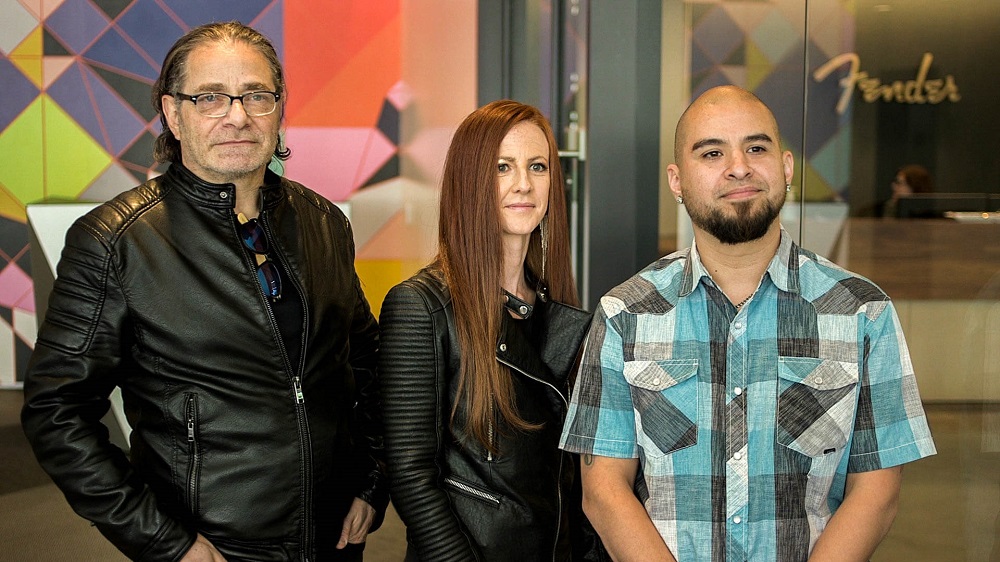
Adam Moseley, Fay Garrison, and Uriel Soto Jr. at Fender Musical Corp HQ
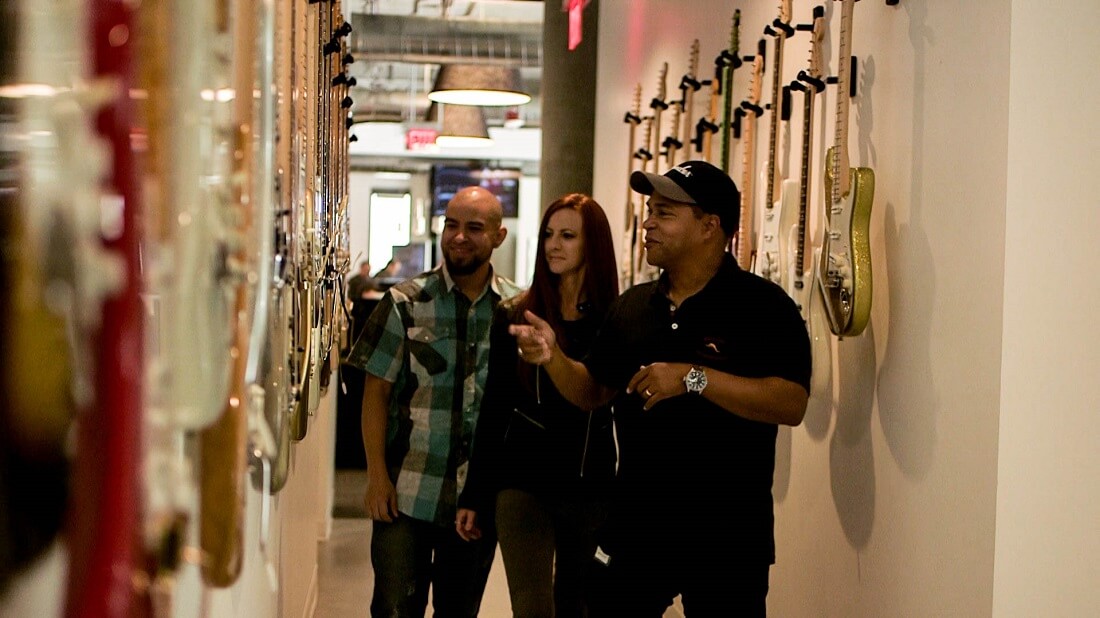
Fay and Uriel with Ed Magee, Fender SVP of Operations
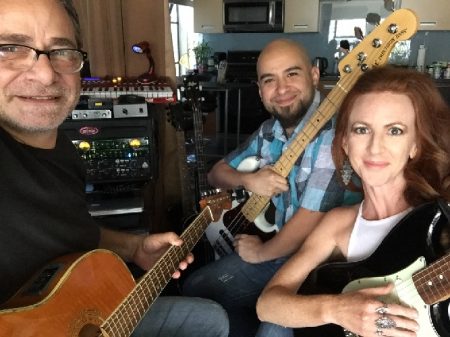 Adam, you have a steadfast adherence to concept as the bedrock of your creative approach to songwriting. Could you tell us more about that?
What is the emotional purpose of the song? Is it meant to make people happy, sad, fall in love, fall out of love, make them angry, depressed, melancholic, make them want to go out and party all night? Whatever the purpose of your song is, really think about it, define it, think about what colors and sounds and dynamics will achieve that. And then you can set about filling in the spaces of your empty canvas and creating that song that does exactly what you intended. But you have to have a plan. You have to have a concept.
How was Adam able to see where you were at, meet you at your level, then help you elevate your game?
Fay: Uriel and I both have a great awareness of mixing…When [Adam] met us and started working with us, he recognized our awareness and understanding already and basically told us “Great. You know, we can really, really push and go far because we’re already there.” And we’re hungry. We want to know. I mean, I’m just taking notes viciously when we’re in session with Adam because he’s got so much to offer.
Uriel: With Adam, what I’ve learned more than anything is focus. Focus and to just narrow in on an idea. It’s happened to me in the past that I start putting a lot of ideas together that in the beginning had a concept, and then I end up going many different directions… So Adam helped me to narrow in and focus on the concept which is great…I guess I knew it but I don’t know if I just started forgetting that but it’s good to have somebody to remind you and to show you that’s the way to make music. He’s been making music for over 40 years.
And the second thing Adam helped me understand is the mixing and how much mixing is an art. Mixing is definitely not a two-dimensional, flat plane. Mixing has so many different things going into it, height, it has depth, it has width, it has so many different things that you can add to make a great song sound even better.
So in your approach is it a question of analog or digital, or do you choose to go with both?
Adam: At the end of the day, it’s the song that counts, and getting an honest performance. With old songs, people hear them, people love that were recorded 20, 30, 40 years or more ago, if it’s an old Beatles song or an old Radiohead song. Technology has always changed, you know? Every 10 years McCartney could be going, “Oh, now there’s more technology, now I get it. Let me go and re-record everything again.” Radiohead could go back and think, “Oh my god, we did those songs so long ago. Technology is so much better. Let’s redo ‘Creep’ or ‘The Bends’ or whatever.” If you captured an honest, true performance at the time, it stands the test of time.
Adam, you have a steadfast adherence to concept as the bedrock of your creative approach to songwriting. Could you tell us more about that?
What is the emotional purpose of the song? Is it meant to make people happy, sad, fall in love, fall out of love, make them angry, depressed, melancholic, make them want to go out and party all night? Whatever the purpose of your song is, really think about it, define it, think about what colors and sounds and dynamics will achieve that. And then you can set about filling in the spaces of your empty canvas and creating that song that does exactly what you intended. But you have to have a plan. You have to have a concept.
How was Adam able to see where you were at, meet you at your level, then help you elevate your game?
Fay: Uriel and I both have a great awareness of mixing…When [Adam] met us and started working with us, he recognized our awareness and understanding already and basically told us “Great. You know, we can really, really push and go far because we’re already there.” And we’re hungry. We want to know. I mean, I’m just taking notes viciously when we’re in session with Adam because he’s got so much to offer.
Uriel: With Adam, what I’ve learned more than anything is focus. Focus and to just narrow in on an idea. It’s happened to me in the past that I start putting a lot of ideas together that in the beginning had a concept, and then I end up going many different directions… So Adam helped me to narrow in and focus on the concept which is great…I guess I knew it but I don’t know if I just started forgetting that but it’s good to have somebody to remind you and to show you that’s the way to make music. He’s been making music for over 40 years.
And the second thing Adam helped me understand is the mixing and how much mixing is an art. Mixing is definitely not a two-dimensional, flat plane. Mixing has so many different things going into it, height, it has depth, it has width, it has so many different things that you can add to make a great song sound even better.
So in your approach is it a question of analog or digital, or do you choose to go with both?
Adam: At the end of the day, it’s the song that counts, and getting an honest performance. With old songs, people hear them, people love that were recorded 20, 30, 40 years or more ago, if it’s an old Beatles song or an old Radiohead song. Technology has always changed, you know? Every 10 years McCartney could be going, “Oh, now there’s more technology, now I get it. Let me go and re-record everything again.” Radiohead could go back and think, “Oh my god, we did those songs so long ago. Technology is so much better. Let’s redo ‘Creep’ or ‘The Bends’ or whatever.” If you captured an honest, true performance at the time, it stands the test of time.
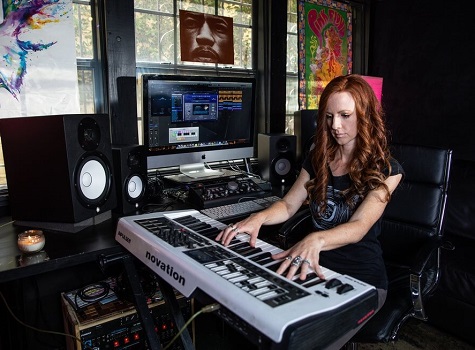 Fay: The physical [aspect of the] instrument that you play affects the sound that comes out. It’s just funny because I don’t think people realize that that also happens with outboard gear, you know? I honestly have to say that I never really factored that into my thinking. That a giant piece of outboard gear would have every channel cut up just slightly differently.
And those slight differences affect the entire sound of a composition. And listening to Adam talk about that saying, “Oh, you know, when we put this on [that console]” And [then Adam] he says, “You can put this on your mix” and without even turning any of the knobs, it’s going to give a certain character to your piece, because it’s going to add in some frequencies that weren’t there before, just based on the design of the hardware…And he’s showing us these tricks to just smooth out that kind of that digital edge, because, he says, no matter how pixelated something is digitally, it’s still going to have that binary corner, you know, that digitized corner. So he’s taught us how to add in these random noises from hardware, to help soften that.
Fay: The physical [aspect of the] instrument that you play affects the sound that comes out. It’s just funny because I don’t think people realize that that also happens with outboard gear, you know? I honestly have to say that I never really factored that into my thinking. That a giant piece of outboard gear would have every channel cut up just slightly differently.
And those slight differences affect the entire sound of a composition. And listening to Adam talk about that saying, “Oh, you know, when we put this on [that console]” And [then Adam] he says, “You can put this on your mix” and without even turning any of the knobs, it’s going to give a certain character to your piece, because it’s going to add in some frequencies that weren’t there before, just based on the design of the hardware…And he’s showing us these tricks to just smooth out that kind of that digital edge, because, he says, no matter how pixelated something is digitally, it’s still going to have that binary corner, you know, that digitized corner. So he’s taught us how to add in these random noises from hardware, to help soften that.
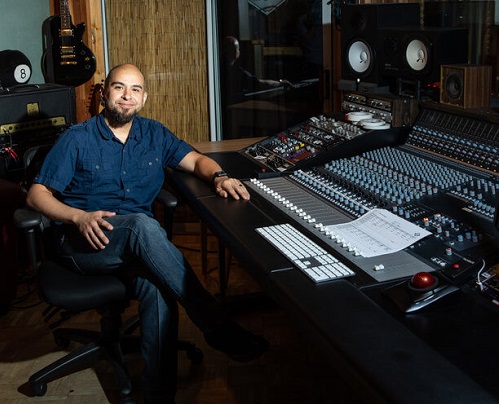 Uriel: I’d say 50/50. Even at home where I do a lot of my work, I do use some samples but if I need a bassline, I grab my bass and I record it through an amp. If I feel like I need some tambourine, I record a real tambourine. I mean, there’s only so much you can get from samples but if you’re hearing something and you can record it, record it. Experiment while recording, experiment with what you’re listening to.
We bring in our Fender guitars, Fender basses, and it’s always fun to record to something that’s there in digital as an idea but then if I hear a bassline that’s already recorded, let’s record it, let’s add some distortion, let’s figure out different ways. There’s always the conventional way that everybody does it but let’s experiment with something different.
Fay: I recently bought a Fender Duo-Sonic™ HS after they personally helped me pick a guitar that fits my body. Although I already know how to play the guitar, the new Fender PLAY app has been really great at helping me master different styles and expand the number of sounds I know how to make. A lot of what I’m learning is going right back into the song.
Check out our blog to learn more about Fay and Uriel’s experiences with Adam Moseley and Fender!
Uriel: I’d say 50/50. Even at home where I do a lot of my work, I do use some samples but if I need a bassline, I grab my bass and I record it through an amp. If I feel like I need some tambourine, I record a real tambourine. I mean, there’s only so much you can get from samples but if you’re hearing something and you can record it, record it. Experiment while recording, experiment with what you’re listening to.
We bring in our Fender guitars, Fender basses, and it’s always fun to record to something that’s there in digital as an idea but then if I hear a bassline that’s already recorded, let’s record it, let’s add some distortion, let’s figure out different ways. There’s always the conventional way that everybody does it but let’s experiment with something different.
Fay: I recently bought a Fender Duo-Sonic™ HS after they personally helped me pick a guitar that fits my body. Although I already know how to play the guitar, the new Fender PLAY app has been really great at helping me master different styles and expand the number of sounds I know how to make. A lot of what I’m learning is going right back into the song.
Check out our blog to learn more about Fay and Uriel’s experiences with Adam Moseley and Fender!
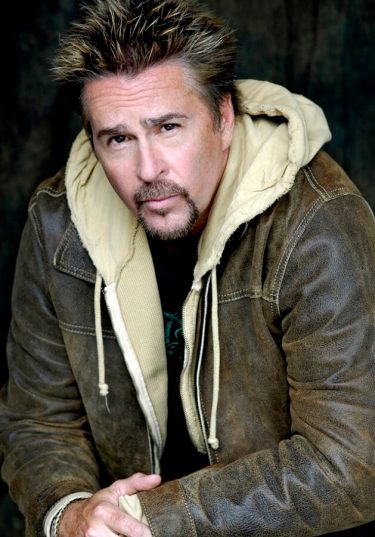
Film Connection mentor Richard Brandes
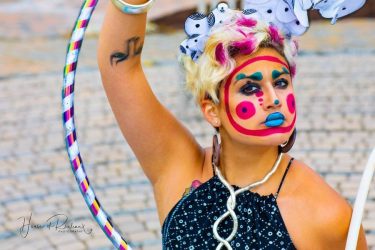 Film Connection student Vanessa Pazmino is surprising herself with just how naturally screenwriting is coming to her, thanks, in part, to her screenplay mentor:
I have had the opportunity each week for the last 4 weeks to have one-on-one, open dialogue, screenplay lecture with Ron Peterson…It’s really incredible how much better I feel my understanding of story structure has gotten in this short time…Ron has offered to help me see my screenplay through to the final act and will allow me to seek his advice in the future…He has given me a real sense of confidence for the future of my writing…
I honestly never thought I could write my own short film until I started speaking with Ron Peterson, film mentor Niko Brabham, and Elliot Campos [Academic Facilitator, RRFC]. I now believe I’ll be able to write a filmable feature length film. Choosing Film Connection has been the most rewarding decision of my life so far!”
Film Connection student Vanessa Pazmino is surprising herself with just how naturally screenwriting is coming to her, thanks, in part, to her screenplay mentor:
I have had the opportunity each week for the last 4 weeks to have one-on-one, open dialogue, screenplay lecture with Ron Peterson…It’s really incredible how much better I feel my understanding of story structure has gotten in this short time…Ron has offered to help me see my screenplay through to the final act and will allow me to seek his advice in the future…He has given me a real sense of confidence for the future of my writing…
I honestly never thought I could write my own short film until I started speaking with Ron Peterson, film mentor Niko Brabham, and Elliot Campos [Academic Facilitator, RRFC]. I now believe I’ll be able to write a filmable feature length film. Choosing Film Connection has been the most rewarding decision of my life so far!”
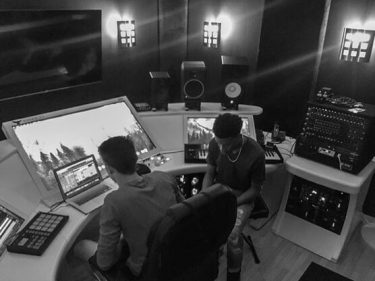 Recording Connection student Jacob Windsor who apprentices (externs) at Mix Master Pro Studios is picking up speed and proficiency fast. Plus, the real-world experience is helping him make plans for the future:
“This week was a major breakthrough when it comes to Pro-Tools! I’m starting to feel comfortable with using Pro Tools while recording an artist and while mixing my tracks. By ‘comfortable’ I mainly mean, I have a steady work flow and I’m able to use the beginner shortcut keys with ease…This week with my ‘at home studies’ when I wasn’t doing the book work, I was creating loops, finding new sounds, and making tracks to advertise my abilities on social media platforms. My friend and I are currently working on getting our own house closer to the studio so I’m very excited for when this all comes together. I plan to make my new room into more of a studio equipped room with a bed inside of it. That way, when I’m home I’ll still be in work mode and will hopefully increase my productivity…Next week “Plugins & Processing” can’t wait!”
Recording Connection student Jacob Windsor who apprentices (externs) at Mix Master Pro Studios is picking up speed and proficiency fast. Plus, the real-world experience is helping him make plans for the future:
“This week was a major breakthrough when it comes to Pro-Tools! I’m starting to feel comfortable with using Pro Tools while recording an artist and while mixing my tracks. By ‘comfortable’ I mainly mean, I have a steady work flow and I’m able to use the beginner shortcut keys with ease…This week with my ‘at home studies’ when I wasn’t doing the book work, I was creating loops, finding new sounds, and making tracks to advertise my abilities on social media platforms. My friend and I are currently working on getting our own house closer to the studio so I’m very excited for when this all comes together. I plan to make my new room into more of a studio equipped room with a bed inside of it. That way, when I’m home I’ll still be in work mode and will hopefully increase my productivity…Next week “Plugins & Processing” can’t wait!”
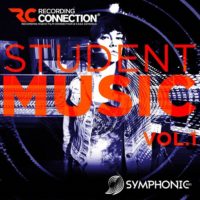 Heard our Student Music Mixtape yet? In partnership with Symphonic Distribution, we’re excited to help our students get their music out to the world!
The Recording Connection is now offering this great opportunity for our students to broaden their understanding of the new role digital distribution companies like Symphonic Distribution can play in helping release their tracks and propel their careers forward!
Heard our Student Music Mixtape yet? In partnership with Symphonic Distribution, we’re excited to help our students get their music out to the world!
The Recording Connection is now offering this great opportunity for our students to broaden their understanding of the new role digital distribution companies like Symphonic Distribution can play in helping release their tracks and propel their careers forward!

RRFC is education upgraded for the 21st century.
Get the latest career advice, insider production tips, and more!
Please fill out the following information, and RRFC Admissions will contact you to discuss our program offerings:
Stay in the Loop: Subscribe for RRFC news & updates!
© 2024 Recording Radio Film Connection & CASA Schools. All Rights Reserved.


